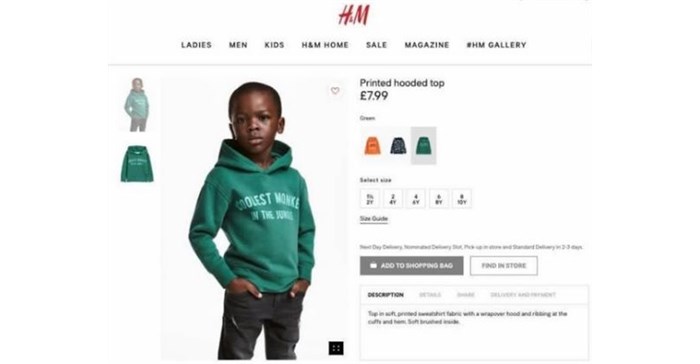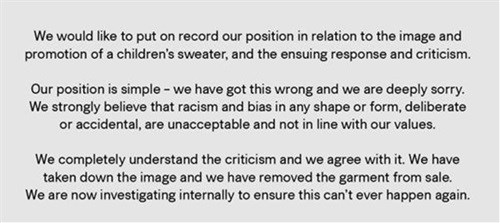
H&M was immediately apologetic saying they believe racism in any shape or form – deliberate or accidental – is unacceptable. They attempted to quash the vehement criticism directed at them, subsequently withdrawing the ad from its UK website and removing the item from its stores. But it may have been too little too late in our global village fuelled by social media.
On 17 January, I noticed that it was “business as usual” with normal adverts for the company’s products being featured and no sign of an apology on the home page. However, on the same day, the South African site carried a grey block across the front with its apology: “…we have got this wrong and we are deeply sorry.” Clearly, the company sees the incident only really as a problem for their brand in South Africa.

When I read the company’s published statement, I hear the lyrics of Demi Lovato’s “Sorry Not Sorry” song in my head. One has to wonder how in 2018, a massive brand such as H&M, which was ranked the 23rd best-known company worldwide in 2017 by Interbrand, can make such an appalling error. Perhaps the better question to ask is – in light of the extreme offensiveness of this message, is “sorry” good enough? And, what will be the true cost of the damage to H&M’s reputation? Will they get away with this racial insult so easily?
There is no defence for H&M on this matter, which is why they’ve taken a “mea culpa” approach. It has exposed their business in the most unflattering light. Before the scandal, in December 2017, H&M group announced a 4% drop in fourth-quarter sales from the previous year, to €5.0 billion ($6.22 billion). It will be interesting to follow how this debacle is reflected in the Group’s financial performance in the next few months.
I find it hard to believe that there is such a lack of staff diversity and of critical thinking in the H&M global conglomerate, which directly employs over 161,000 people worldwide in more than 4,500 stores in 69 markets. How is the company testing its messages before they are deployed to markets? Despite the product behind the insult not being available in South Africa, the company appears to have failed to understand the global nature of its consumers and the power of social media on their reputation.
This gaffe is either pointing to very poor processes and lack of corporate accountability in H&M – or worse – a culture of systemic racism supported by a lack of diversity and critical thinkers within the company and its advertising agencies.
While the price tag of this offence is still being calculated for H&M, it now joins the ranks of infamous companies who have recently offended our common sense and values. Bell Pottinger, the UK-based reputation firm, saw its own reputational demise in 2017 as a direct consequence of its loss of good standing. Consumer product giants Dove and Nivea also put their foot in it late in 2017 with poorly crafted and offensive adverts that saw them accused of racial insensitivity.
But where are the consequences for H&M? Talk is cheap. When pockets are deep, an apology from a global multinational is an easy, consequence-free escape route. Consider for a moment, the impact of this scandal on customers and staff in local markets, far away from the origin of the offence. Your bank of reputational goodwill with customers in London or Stockholm is not necessarily transferrable to other markets where offence is taken. Continue to insult your customers through arrogance or ignorance about diversity and customer needs, and you’ll find extreme shortages of goodwill and forgiveness when you do make a faux pas – and it may cost you your business or a substantial chunk of your market share.
Reputation management in today’s highly complex world of business is not linear or simple. Reputation cannot be managed in isolation of other critical components that include:
• Sales and marketing
• Ethical business practices
• Transparency
• Business performance
• Attractiveness as an employer
• Social responsibility
• Management quality and culture
• Quality of products and services
• Innovation
Strategic consideration of these nine dimensions of reputation management, as defined by the textbooks, with a specific risk-management lens, will help executives and reputation managers make better decisions.
It’s my view that it is not only the brand owner’s responsibility to act in a more integrated and considered manner when conceptualising campaigns. Advertising agencies who are engine rooms of idea generation should be held to account for advising their clients in a morally and ethically responsible manner. They should be deeply cognisant of and sensitive to market subtleties, and subsequently act responsibly with regards to what they put in front of their clients. Supported by robust testing, review and approval processes, advertising agencies - together with brand and reputation owners - need to rally around the client’s reputation management with a more holistic mindset to achieve the best outcome for the brand.
Furthermore, knowledge of the local market and customer base, and a deep appreciation for the diversity of customers in different geographies, should help with increasingly improved critical thinking and more impactful and appropriate messaging to customers that builds, rather than destroys, reputation. Brand owners need to demonstrate more authentic engagement and understanding of their customers and markets, not only to avoid misunderstanding but also to meet the expectations of stakeholders and build their bank of reputational goodwill in target markets.